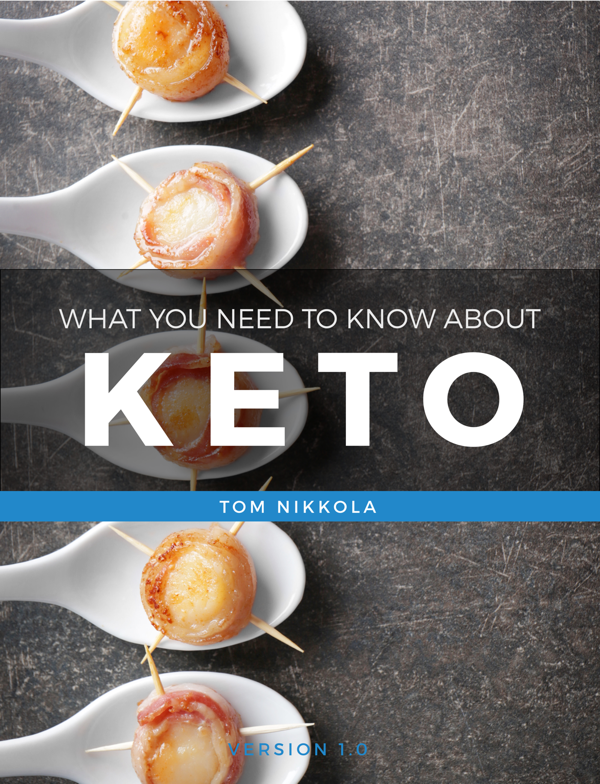
My favorite part of the day begins shortly after I wake up. Our home is cold from turning down the thermostat overnight–there’s a little bit of a chill (Vanessa would say it's freezing), whether it’s winter or summer.
Barefoot, I walk to the kitchen and make a cup of coffee. The warmth of the cup, the bitterness of the dark roast, and the idea of a new day, makes for an experience I look forward to every morning.
I’m not alone in my affection for coffee.
About 83% of US adults drink some form of coffee throughout the day. About one-third of coffee drinkers choose some souped-up, sugary concoction that’s often closer to a milkshake than a cup of coffee, while a growing percentage of people seem to be enthralled with Bulletproof™ coffee.
For me, I just like it black, made with as dark a roast as I can find.
Although coffee consumption is at an all-time high, those in health circles seem to be on polar ends of the conversation around coffee’s potential health benefits.
There’s a lot of evidence to suggest coffee offers significant health benefits. At least it does when it doesn’t include a ton of extras in it.
Coffee and Blood Sugar Control
Coffee consumption is associated with significantly lower risks of developing metabolic syndrome.[i] Metabolic syndrome and insulin resistance or type II diabetes often go hand in hand.
Interestingly, regular coffee consumption is also associated with reduced risks of developing diabetes. One study showed that by increasing their daily coffee intake by one cup per day, the participants saw an 11% lower risk of type II diabetes four years later.[ii] The reduction in diabetes risk occurred in those who drank caffeinated coffee, but not decaffeinated coffee or tea. Even more fascinating, the study suggested that those who reduced their coffee consumption increased their risk of developing type II diabetes.[iii]
As good as that sounds, let’s not pretend that a Starbucks 16-oz White Chocolate Mocha, with 59 grams of sugar, is going to improve your blood sugar levels. It could send you in the wrong direction. I would also add that if you pair up that cup of coffee with a donut (do people still do that?) or bagel, you’ll also be taxing your blood sugar regulation.
Coffee and Brain Function
Coffee consumption is associated with less risk of developing Multiple Sclerosis, Parkinson’s and Alzheimer’s.
This is interesting because one of the reasons people are warned about drinking coffee is that coffee beans are at the top of the list of crops treated with pesticides, and pesticides may lead to neurological dysfunction.[iv]
While I usually recommend organic foods when possible, I don’t see a good reason to dissuade someone from drinking coffee if it isn’t organic. With Vanessa’s family history of dementia, I’m all for her drinking her two cups of (organic) coffee every day.
Coffee and Liver Function
The liver has a tough job. It has to filter out all the junk in our diet, and is further taxed by high intakes of fructose or alcohol, which contribute to fatty liver disease. One might assume that with coffee being a common source of pesticides, drinking coffee would tax the liver. You might also assume that someone with liver problems would be better off by not drinking it.
And according to the evidence, you’d be wrong. Regular coffee consumption is associated with lower mortality from liver disease and a lower risk of developing alcoholic and non-alcoholic fatty liver disease, liver fibrosis and liver cancer.[v] There’s even evidence that drinking coffee is helpful for those who have liver disease.
Coffee and Cancer
Coffee consumption is also associated with a reduced risk of certain types of cancer.[vi] That said, there are a lot of diet and lifestyle choices that can help reduce the risk of developing cancer. Drinking more coffee probably won’t be nearly as helpful as some of those.
Higher intakes of coffee are also associated with lower risks of death from heart disease, stroke, infections, respiratory disease and accidents.[vii] Caffeine intake is associated with a reduced risk of developing kidney stones, which could be another benefit of non-decaffeinated coffee.[viii]
Coffee and Acid/Alkaline Balance
I sometimes hear or read that coffee is acidic, and drinking it can increase acidity in the body and lead to problems with bone density. It’s a similar argument some people have for not eating, or limiting meat.
The body keeps a very tight reign on the pH levels in the blood. If blood pH levels vary just fractions of a percentage, it can lead to major problems. However, urine pH levels vary quite a bit. That’s how the kidneys help maintain a healthy pH balance. Urine pH levels have nothing to do with blood pH levels.
I have never seen anything in research that has convinced me this is an issue. This topic would require a blog post of its own, so if you want to read more about it right now, check out The Alkaline Diet Myth: An Evidence Based Review.
Coffee and Dehydration
When I was studying nutrition and exercise physiology in college, I recall the professor stating that we needed to drink more water when we drank coffee. Otherwise, we would suffer the wrath of dehydration. You may have been told the same thing.
Coffee contains caffeine, and caffeine, in high doses, can have a diuretic effect. At least that seems to be the case in the short-term. If you take in over 500 mg of caffeine, the equivalent of about four cups of coffee, the caffeine can have a short-term diuretic effect. But you’re also drinking 4 cups of liquid, so the net result is a greater intake of water than the amount that may be lost.
It seems that people who habitually take in higher amounts of caffeine adapt to it, and the diuretic effect disappears.
According to the available research, drinking coffee does not lead to dehydration, and your coffee intake can count toward your daily water intake.[ix]
Coffee. Black or Bulletproof?
Finally, what’s the deal with Bulletproof coffee? Vanessa loves Bulletproof coffee, and drinks it every morning, at least when we’re at home. I prefer my coffee black and bitter.
For those following a very low carbohydrate diet, or intermittent fasting, Bulletproof coffee can be part of a healthy nutrition plan.
Bulletproof coffee is very high in fat. Yes, the fats can be considered “healthy fats,” but when you combine them with a bowl of cereal, a bagel or other carbohydrate-rich foods, it’s a recipe for disaster.
My issue with people jumping on the Bulletproof bandwagon is that many of them aren’t following a strict, low-carb diet, or they’re not really doing intermittent fasting. In those cases, adding a lot of fat and calories, is a great way to gain body fat, raise triglycerides and potentially lead to other health problems.
Vanessa and I usually eat our first meal between 11:00 and noon. So for her, she gets a lot of the satiating and cognitive-supporting benefits associated with Bulletproof coffee. And it tastes awesome.
For me, I love the taste, too, but just didn’t feel any benefits from it, and I felt like it actually detracted from my workouts.
The point is, in the right context, Bulletproof coffee can be good. In the wrong context, that’s not the case.
That’s a Latte
Can coffee drinking be taken to an excess? Yes. If your “one cup” per day is actually a pot of coffee, or you tell yourself your two 24-ounce cups per day is “just 2 cups,” realize that’s over a third of a gallon of coffee.
Moderate coffee consumption is usually considered 2-3 cups per day. At that level, there are all sorts of health benefits associated with this liquid treasure.
In the pursuit of optimal health, a couple cups of coffee is one of the daily habits you don’t have to drop.
Thanks for reading. If you learned something new, please share.
[i] Mure K, Maeda S, Mukobayashi C, et al. Habitual coffee consumption inversely associated with metabolic syndrome-related biomarkers involving adiponectin. Nutrition. 2013;29(7):9820987
[ii] McNamee D. Increased coffee consumption may reduce risk of type 2 diabetes. Medical News Today. MediLexicon, Intl. 25 Apr. 2014. Web. 23 Feb 2015
[iii] Bhupathiraju SN, Pan A, Manson JE, et al. Changes in coffee intake and subsequent risk of type 2 diabetes: three large cohorts of US men and women. Diabetologia. 2014;57:1346-1354
[iv] Kamel F, Hoppin JA. Association of Pesticide Exposure with Neurological Dysfunction and Disease. Environ Health Perspect 2004;112:950-958
[v] Tahan AC, Tahan V. “Could a cup of coffee a day keep the liver doctor away?”: One cup or two or more cups of coffee per day reduces the risk of death from cirrhosis. Turk J Gastroenterol. 2014;25:470-1
[vi] Nuhu AA. Bioactive Micronutrients in Coffee: Recent Analytical Approaches for Characterization and Quantification. ISRN Nutrition. 2014 http://dx.doi.org/10.1155/2014/384230
[vii] Kumari R, Kim WR. Coffee – A panacea or snake oil for the liver? Clin Gastroenterol Hepatol. 2014;12(9):1569-1571
[viii] Ferraro PM, Taylor EN, Gambaro G, Curhan GC. Caffeine intake and the risk of kidney stones. Am J Clin Nutr. 2014;100(6):1596-1603
[ix] Killer SC, Blannin AK, Jeukendrup AE. No Evidence of Dehydration with Moderate Daily Coffee Intake: A Counterbalanced Cross-Over Study in a Free-Living Population. PLoS One. 2014;9(1):e84154
What You Need to Know About Keto Ebook
The keto diet has attracted many followers for good reason. It's an effective tool for blood sugar management and weight loss.
It also has proven benefits for various health concerns.
What You Need to Know About Keto is not another copycat keto ebook.
It's a real-world, practical review of the diet and an action plan, based on 20 years of observation, education, and experience.
Whether you're new to keto, or you're #ketoaf, this book has something for you.
